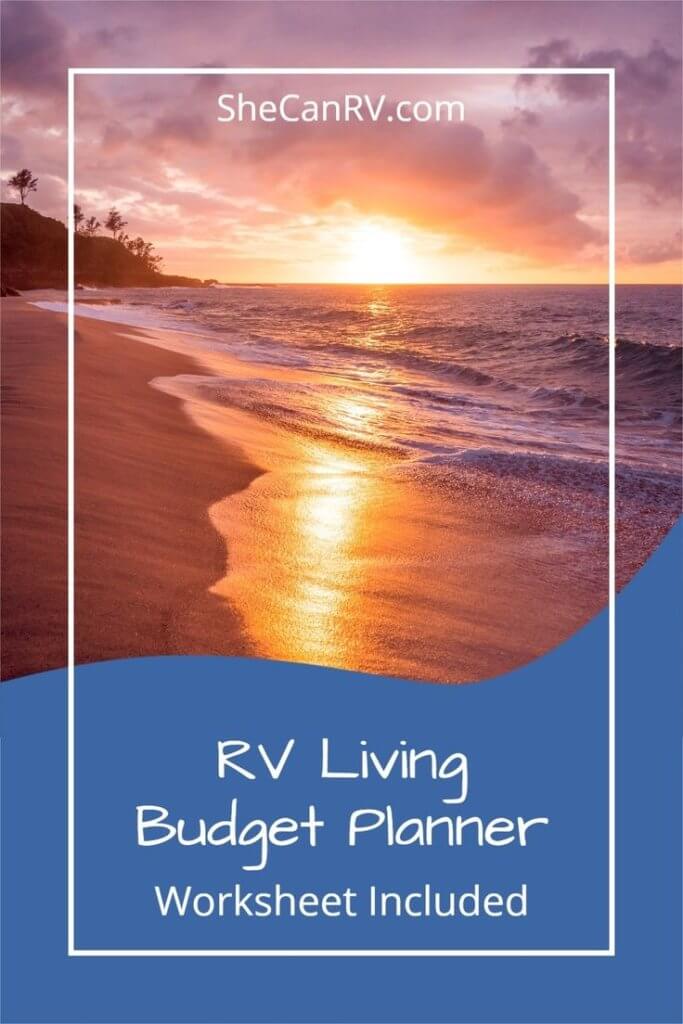Now that I’m set up with my truck and trailer, I have to keep my full-time RV living budget low. This tight budget situation started about a year ago and it’s been a real learning experience. I’m making changes to the way I travel so I can continue this lifestyle I love so much. I’ve included some tips to help you determine how much to budget each month to give you the travel lifestyle that works best for you.
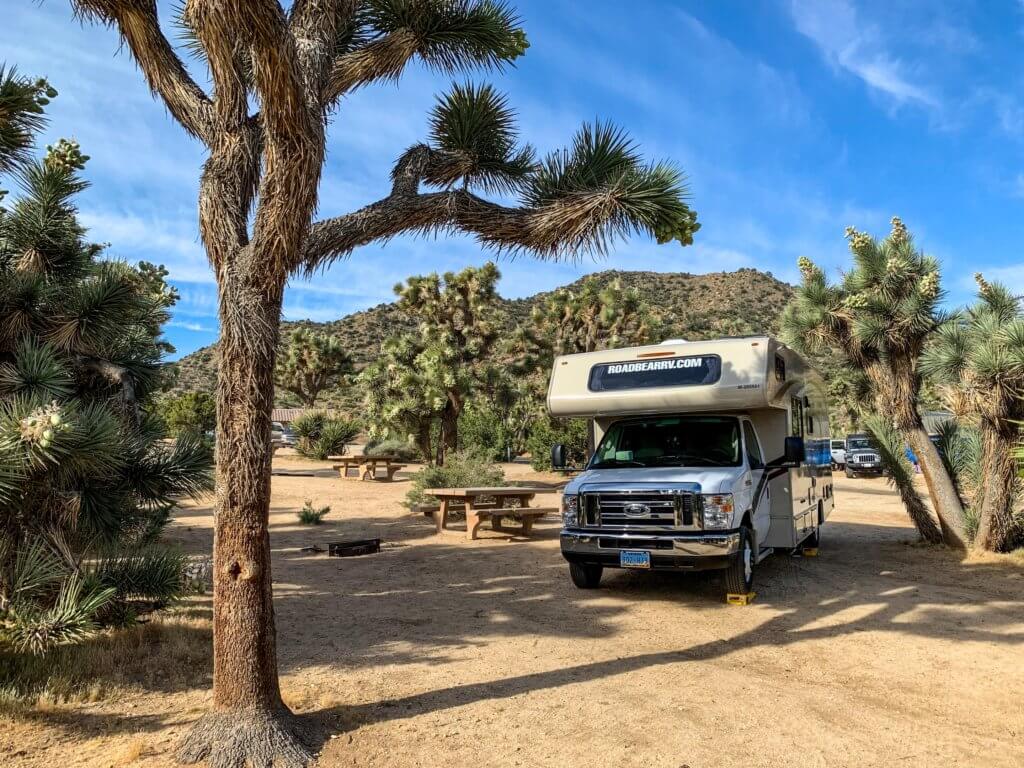
Building Your Full-time RV Living Budget
You may have been dreaming of living in an RV for a while, but it’s time to consider some of the practical sides of RV living, like your RV living budget. Never fear, this post will give you a great big chunk (in small bites) of useful information to help you plan all aspects of a typical RV’ers budget.
Many factors go into determining how much you spend when living in an RV. While it is possible to live this life on a shoestring budget it’s also possible to spend many thousands of dollars each month on a lavish RV lifestyle. You’ll have to determine what your budget allows.
When planning your monthly full-time RV living budget, you’ll need to consider at least the following categories.
RV Payments
Build in the cost of your RV payments if your rig is financed. If at all possible avoid having a payment. There is something to be said for purchasing a used RV.
Since 2008 when the financial crisis hit the quality of new RVs coming off the line has gone downhill. It’s not uncommon for the owner of a new RV to be plagued by problems. Their RV may end up sitting at the repair shop waiting for weeks or even months for warranty work to be done because things weren’t done properly when it was assembled.
Basically, a used RV has had most of the problems discovered and repaired. Of course, this is not true for every used RV, but if I had a do-over on the first two RVs we owned, they would have been used instead of new. When I purchased Airstream it was two years old and very gently used. I haven’t had any problems with it except those I caused myself.
Additionally, the market is so stressed since the COVID buying frenzy started companies are manufacturing RVs at an alarming rate to try and keep up with the demand. Pressure to make more can lead to cutting corners and shoddy workmanship. Keep in mind, that repair shops are overwhelmed and parts are scarce while we ride out this COVID-induced upswing in RVing and shortage of labor to repair them.
I’m very fortunate in that my Airstream is paid in full so that’s one line item I can leave off my budget.
RV Insurance
One really important thing to know about RV insurance is if you are a full-time RVer, you absolutely MUST tell the insurance company and make sure your insurance covers you for full-time living. There are only a few insurance companies that cover full-timers so do your research. If you neglect to provide that information you may end up having a claim denied and your insurance canceled.
Another nugget of information, if you have a roadside assistance plan through a company such as AAA or GoodSam, you probably won’t need one through your insurance company. Keep that in mind when you’re choosing your policy.
This article from Kiplinger gives a lot of good information about RV insurance. RV Insurance: Everything You Must Know
RV Maintenance and Repairs
When it comes to RV maintenance it’s best to plan ahead. Some things will need to be done after a certain number of miles, months, or years. Take a look at the owner’s manual to see what the recommended service schedule looks like and get some prices so you can be prepared when the time comes.
RV service is expensive whether you’re driving around a diesel pusher motorhome or pulling a tent trailer. For my travel trailer, I need to have my never lube wheel bearings changed out in the next year-ish. I’m almost certain I’ll have my axles replaced at the same time. The parts alone will cost about $2,500.

Things to plan for are batteries, tires, brakes, bearing packing, sealing seams, inspecting the propane system annually, and much more. There’s really no way for me to give you even a ballpark figure for this because it varies so widely. I do a lot of my maintenance myself so if you’re handy at all, you can save yourself some cash.
Calculating this into your full-time RV living budget can be tricky. My best advice is to make sure your rig is in good shape before you head out. I suggest having it professionally inspected for safety at least once annually. Tires should be replaced every 3 – 5 years regardless of mileage because the rubber degrades over time so you’ll need to plan for that.
Estimate your maintenance expenses as best you can and be prepared for unexpected repairs.
Vehicle Payments
The condition of your tow vehicle is a matter of safety so do the best you can here without going deep into debt. My first tow vehicle turned out to be inadequate for my pulling my trailer. I learned that over time as I was towing around the country. I was fortunate enough to be able to upgrade to a bigger truck and I feel much safer. I bought used, traded my old truck, and was able to pay cash for the difference.
I didn’t feel I had a choice about upgrading because my safety, Murphy’s safety, the safety of my home, and my belongings were on the line.
Again, this can be all over the place. My advice if you’re buying a vehicle to tow your travel trailer or 5th wheel with is to make sure you have enough truck (or whatever you get) to not only pull your rig, and haul all your gear.
I frequently hear people say, you can pull that trailer with that truck, no problem. In my mind, the real question is, can the tow vehicle stop the trailer? The steep downhill side of a mountain pass is no place to find your tow vehicle is not up to the task.
Here’s a great article from Boondockers Welcome that will help you understand more about tow vehicles even if you’re not buying a used one. 10 Tips for Buying A Used Tow Vehicle
Vehicle Maintenance
Whether you’re towing your RV with a vehicle or towing your vehicle behind your motorhome, you’ll need to maintain it properly. You don’t want to break down while you’re on the road.
Keep in mind if you’re towing a travel trailer or 5th wheel, your tow vehicle will need additional care because it’s working harder than the average daily driver. Check the recommended service schedule for your vehicle in your manual or online. There will be recommendations for severe driving conditions. Those are the guidelines you want to follow when maintaining your tow vehicle.
I use full synthetic oil which allows me to go longer between oil changes. Most tire manufacturers recommend having your tires rotated every 5,000 miles. I also like to have my maintenance done at the Ford dealer’s quick stop locations. It’s actually a bit less than some other places I’ve visited. My most recent visit for an oil change and tire rotation on my Ford F250, gas engine, came in just under $80. I’ve paid as much as $100 for just an oil change when my options were limited.
RV and Vehicle Licensing and Inspection
We can’t forget licensing our RV and vehicle each year. Not all counties or states require a vehicle inspection before licensing but many do. This can make renewing your RV and vehicle licenses difficult while you’re on the road. Be aware of what is required by your place of residence and adjust your plans accordingly.
In Washington State, I can renew my vehicle license online and the new date stickers are mailed to my residence address. They are forwarded to me with the rest of my mail. The cost for these licenses varies widely from state to state.
Roadside Assistance Plans
My Roadside Assistance is through AAA. My plan is AAA Premier RV and I’ve had the pleasure of using their services. They were outstanding. The cost for this plan is currently $172 annually. However, due to my late husband’s AAA life insurance policy, my basic AAA membership will be free for life and that currently saves me $60 annually.
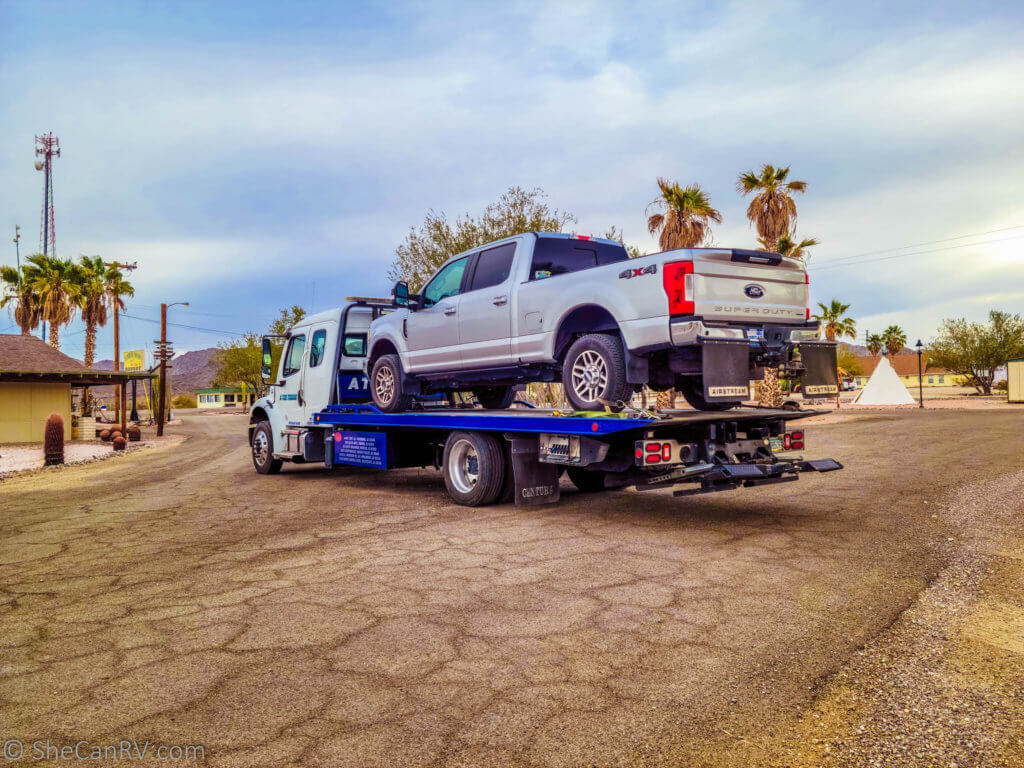
Other companies offering roadside assistance include Coach-Net, Good Sam, and FMCA just to name a few.
Mortons On The Move has a great article about roadside assistance plans for RVs.
RV Gear Replacement
It’s a good idea to budget a small amount for necessary gear. Nothing RV-related is inexpensive. If your sewer hose springs a leak, you’ll spend $30 to $50 for a new one. Water hoses blow out occasionally, you really just never know. Inspect your gear often to make sure it’s still in functional condition.
Fuel Costs
Fuel costs have risen to record highs and are causing many RVers to rethink the way they travel.
This one varies widely and will really depend on your camping style. If you’re constantly on the move, you’ll rack up fuel costs fast. The last time I drove from Arizona to Washington my fuel costs were over $600. At today’s prices, the cost would be more than double.
Fuel prices fluctuate wildly and are always higher in certain states like Washington and especially California. When you cross the border from Oregon into California, you can expect to see an increase of about $1 per gallon.
When I’m towing, my gas mileage averages 10 mpg, give or take. However, I’ve gotten as low as 6 mpg with hilly conditions or headwinds and as high as 14 mpg on flat terrain or with tailwinds. Some motorhomes get around 6 mpg all the time.
If your camping style is moving once every two weeks or even monthly, you’ll save yourself a lot of cash. I find myself doing more of this lately. Staying longer is much easier on the RV living budget.
When I’m traveling across the country I generally drive about 300 miles in a day. At 10 MPG, 300 miles (at $5 a gallon) will cost me $150 each travel day. That smarts!
Site Rental
This item can be one of the largest line items in your full-time RV living budget. The cost of staying at campgrounds is skyrocketing as demand increases and supply just can’t keep up. When we started RVing almost a decade ago, a night at a full-hookup campground was around $25. The nightly rate at most of the campgrounds I stayed at on my trip last winter was nearly double that amount.
There are a lot of ways to save on campsites. Here are a few of my favorites.
Longer stays – Most campgrounds will give a price break for a weekly stay. Normally it’s a 7-day stay for the price of 6-days. Monthly stays are generally deeply discounted so it may save you a significant amount of money to stay longer in one place. Your fuel costs will be much lower too.
Dry camping in parking lots (with permission) like Walmart or Cracker Barrel. If I’m moving several hundred miles I’ll stop for the night somewhere I can stay free. You should always patronize the business courteous enough to put you up for the night so while it’s not exactly free, you’ll be able to grab some groceries or a meal.
Boondocking – I’ve learned to love boondocking. I get to go on an adventure to find a beautiful, secluded place to camp with very few or no other people around. It’s my absolute happy place and it’s free! What could be better?
Boondocking and Dry Camping Successfully
Campground membership discount plans – Passport America and Harvest Hosts are my two favorite membership plans. I’ve found purchasing these two memberships has paid for itself over and over.
5 Reasons Why I Love My Passport America Membership
Save On The Cost of RVing – My #1 Favorite Tip
Electricity (Monthly or Longer Stays)
Generally speaking, electricity is included on nightly and weekly stays.
If you stay at a private RV park on a monthly basis, you can expect to pay for your electricity. They may require a deposit upfront but will refund you the difference if you don’t go over the deposit amount. If you exceed the deposit amount, you’ll be required to pay the difference at checkout. These sites are metered so park staff will need to read the meter before you checkout.
Most State and Federal campgrounds don’t allow stays longer than 14 days so it won’t be a consideration when camping there.
On very rare occasions, I’ve been charged for electricity for nightly stays. it’s usually in the form of a surcharge of $2 – 5 per night. I find that tends to be regional.
In general, unless you have long-term stays of a month or more, you won’t accrue charges for electricity. That’s one less thing to add to your full-time RV living budget.
Propane Refills
Some of your RV components probably run on propane. Propane appliances include most water heaters, some refrigerators, your stove and/or oven, and your furnace. When I have an electrical hookup, I only use propane for my stove. My refrigerator allows me to choose electric or propane, and my water heater does the same.
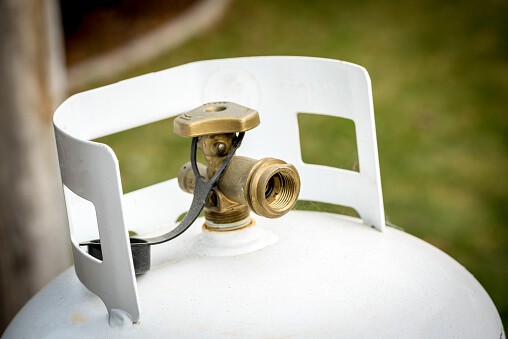
My AC unit has a heat pump feature so I use that when it is above 40 degrees. Heat pumps are not effective below 40 degrees so at that point you’ll need to switch to the furnace to keep warm. Additionally, you’ll want to use your propane furnace in freezing temperatures because it keeps your plumbing and tanks from freezing which will cause expensive damage to your rig.
When using propane for heat and to heat your water, you’ll go through it fast. When I have electric hookups, a 30-pound tank of propane will last me as long as 8 months because the only thing I’m using propane for is my stove. In the winter, depending on how cold the temperatures are, I may go through an entire 30-pound tank in 5-days.
Money-saving tip – Turn your water heater on for 30 – 45 minutes to heat your water then switch it off. The water stays pretty hot all day and you won’t be burning propane.
These days, the cost of propane generally runs between $2.50 and $4.50 a gallon. My 30-pound tanks hold about 6-gallons each.
Let’s do some math here. If we are in a very cold location and running the furnace continuously we will go through a lot of propane in a month. Every 5 days we have to get one of our 30-pound propane tanks refilled.
- 30 days divided by 5 = 6 (the number of times we need to get a tank filled during the month)
- My 30-pound tanks take about 6-gallons so we will multiply 6 x $4 (price per gallon for this example) = $24.
- We’ll be spending $24, 5 times during a 30-day period. That’s $120 for propane for the month.
*This example is based on my RV and my usage. Yours will vary based on many factors including the cost of propane, exterior temperature, how well insulated your RV is, and how well you tolerate cold conditions.
Groceries
We all have to eat and grocery prices are really going up these days. Your budget will depend on many factors. Personally, I don’t eat out, I choose primarily organic whenever possible. That really drives the cost of groceries upward. However, after years of neglecting my health, I make nutrition a priority and have to cut my full-time RV living budget in other areas to make the expensive groceries possible.

Decide what you’re comfortable with and plan accordingly. Don’t forget to figure those adult beverages into your full-time RV living budget.
Eating Out
This one is also different for everyone. Many RVers eat out several times a week or even daily. Some don’t eat out at all. Just include a realistic figure and adjust as you learn what your habits will be while on the road.
Admission Fees for Activities and Attractions
Is part of your RV lifestyle vision to visit all the attractions along the way? You’ll need a hefty chunk of your full-time RV living budget for that as well. I’m not much of a crowds person so I usually avoid these types of excursions. Some careful travel planning will help you determine what your activities and attractions will cost and allow you to work it into your RV living budget.
Cell Phone and Wifi Plans
I’m lumping these together because they are often billed together. No doubt, this will be a sizeable chunk of your full-time RV living budget.

WiFi is a thorn in the side of many RVers. It’s expensive, often unreliable, and there’s never enough of it. If you’ll be working on the road this is something you should study at length. My personal setup is a Verizon cellphone hotspot, a Verizon Jetpack with “unlimited” data, and an AT&T Mobley (no longer available) with “unlimited” data.
You’ll note unlimited is in quotes. That’s because after you consume a certain amount of data, the company will throttle your wifi. That means they can slow down or deprioritize your usage to an agonizingly slow speed until your billing cycle begins again.
My plans cost a total of $120 monthly.
Television
When we started RVing almost a decade ago, Firestick and streaming weren’t really common yet. We initially went with a Dish Tailgater satellite system. It works fairly well most of the time but has limitations. Last winter, when I shifted to primarily boondocking, I stopped my service and left the gear at home. I really don’t watch much TV anymore. If there is something I want to watch I can usually use my phone or tablet to stream it. That saves me just over $100 each month on my RV living budget.
You can get over the air television reception in many places but when you go out into the middle of nowhere, that option becomes limited or completely disappears.
Many private campgrounds have cable hookups right at the site so take some coax along for those times if that’s your thing.
Mail Forwarding
Like almost all of the categories in this article, your mail forwarding budget can vary widely. Because I have no actual residence, I have chosen to rent a mailbox with an address that sounds like an actual street address. This allows me to use that address as my residence. The cost for this mailbox is currently $240 a year.

They will hold my mail for me until I call with an address where they can forward my mail. They are excellent at tossing magazines, catalogs, and other junk mail so I’m not paying to have garbage shipped. My mail usually fits in a USPS flat rate shipping envelope and costs less than $15 to ship. I don’t get my mail often because most of my business is done electronically.
This is my particular situation. You may choose another method like having your mail sent to a family member’s address and having them forward it to you on occasion. Another option is an RV mail handling business like the one The Escapees Club has.
Health Insurance
Health insurance is particularly costly if you’re under Medicare age. Unfortunately, whether you have medicare or not, your insurance likely won’t cover all of your medical expenses. There will be copayment, deductibles, and non-covered services. Insurance costs vary by zip code, age, health status, smoking, etc. There’s no way for me to guesstimate how much this will add to your full-time RV living budget so I’ll steer you toward the best information I have found on the subject.
Health Insurance for Full-Time RVers: A Complete Guide
Pet Supplies and Care
You may have seen my big, hairy dog on this site. Murphy is a big boy with a high maintenance coat and a healthy appetite. I budget about $200 a month for his expenses alone.
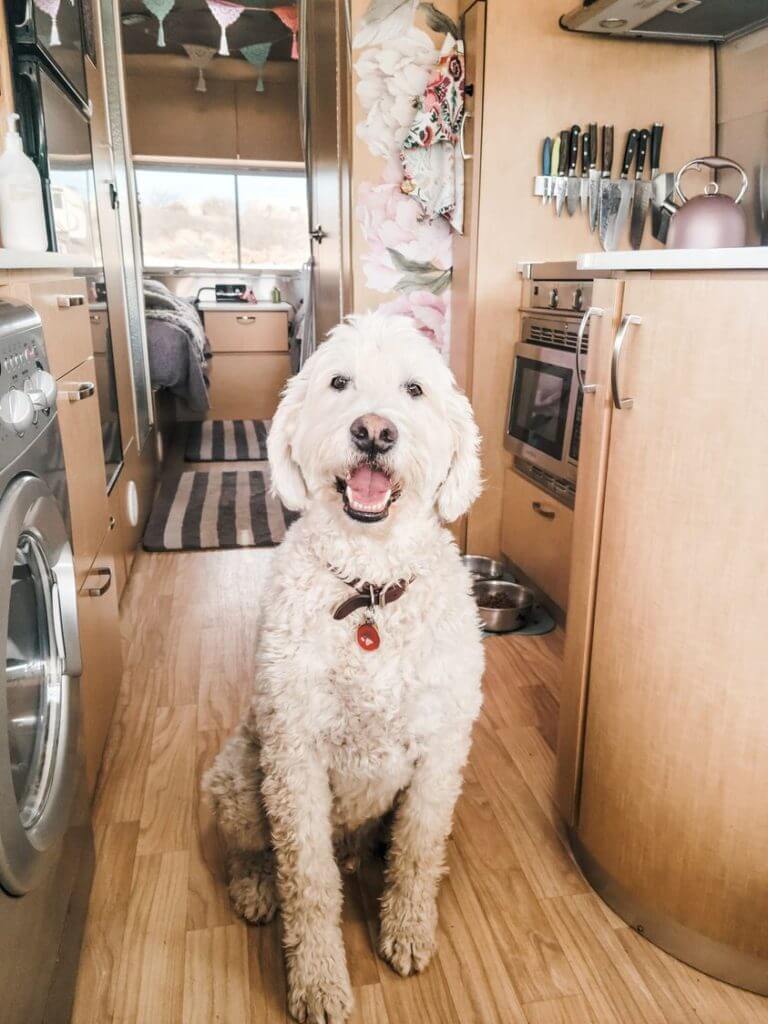
We buy good quality dog food from Tractor Supply because I can find it almost anywhere we travel. His food runs around $50 a month.
I prefer to take him to the groomer because it takes me a full day to groom him and I really don’t have a good place to wash him. A trip to the groomer for this beast runs about $100. If that’s not in the cards in a particular month, I’ll do it myself.
I also keep a pet health insurance policy on him. I feel better knowing if we have an emergency his care will be mostly covered. With as much time as we spend in the truck, and in the wilderness, it gives me a bit of security knowing we have that plan. It covers some of his well care too. The cost is just over $60 a month.
Murphy recently had an emergency poisoning and I was so glad to have this insurance.
RV Living Budget Planner Worksheet
I’ve created a simple part-time or full-time RV Living Budget Planner worksheet you can print and use as a guide to help you through the process. You can download it below.
The Cost of Full-Time RV Living, April 2021
What Is The Cost To Live In An RV – March 2021 Expenses
RV living can be a beautiful and amazing life but it will take some planning and a well-thought-out RV living budget to make sure you have enough funds. The RV lifestyle can be much less expensive than living in a traditional home or apartment, especially if you own your RV outright.
If you found this post helpful, please pin it.
